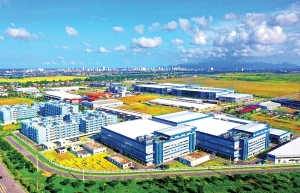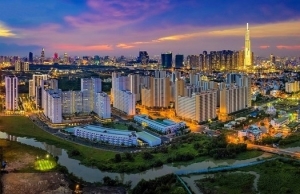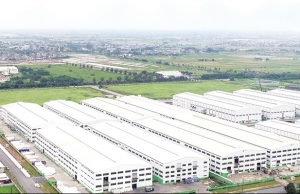Industrial clusters suffering from legal inconsistencies
 |
| Do Gia Long - Deputy director, Hanel Mirolin JSC |
A cluster-based approach is a way to build production networks and value chains, develop a support industry and improve the capacity and the competitiveness of Vietnamese enterprises, especially in the context of the country’s deep global integration and the strategic shift to attracting quality foreign-invested capital.
In Vietnam, Decree No.68/2017/ND-CP from 2017 on the management and development of industrial clusters (ICs) combines separate adjustment regulations for the model. Promulgating Decree 68 was necessary to attract and relocate small- and medium-sized enterprises as well as cooperatives to production areas with modern technical infrastructure, which could ensure the standards of health and safety and sustainable development.
While the current regulations encourage the establishment of ICs, in reality, investors face many barriers during the implementation of their projects.
The first blockade is the inconsistency between legal documents relating to the scale of the ICs. Decree 68 regulated that an IC has an area not exceeding 75 hectares and not less than 10ha. An IC in a mountainous district or a craft village has an area can be as small as 5ha in size.
Based on Decree 68, Hanoi People’s Committee proposed the city’s IC planning to the Ministry of Industry and Trade for approval. In 2017, the ministry regulated that by 2030, Hanoi will have almost 160 ICs with a total area of 3,200ha. Many of these ICs have an area of 5ha upward.
However, in October 2022, the same People’s Committee enabled Decision No.33/2022/QD-UBND on policy to manage ICs in Hanoi, which regulates that the minimum area is now 30ha for normal clusters and 15ha for those in mountainous areas or craft villages.
This inconsistency now means that some clusters exist, or are being planned, that are too small in area to line up with the latest regulations.
In addition, industrial real estate developers are confused with the inconsistency in regulations relating to the right to choose the method of land rental payment. Notably, the Law on Land 2013 regulates that economic organisations, self-financed public non-business organisations, households, individuals, overseas Vietnamese, and foreign-invested enterprises may choose between the form of annual rental payment or full one-off rental payment for the entire lease period.
During the process to implement Dai Thang IC, located in Phu Xuyen district of Hanoi, we have been struggling to resolve this problem. In November 2021, Hanoi People’s Committee allowed Hanel Mirolin to hire 73.73ha to develop Dai Thang IC, and simultaneously allowed the company to pay a full one-off rental fee for the entire lease period.
However, in July last year, the People’s Committee changed the agreement and now requires Hanel to pay the land rental fee annually, a decision which surprised the company’s board of directors.
In some cases, the lack of flexibility in allowing investors to select the form of land rental payment causes inconvenience for enterprises. At Dai Thang IC, Hanel Mirolin paid a deposit of VND56.89 billion ($2.4 million) for the land clearance and compensation, and the deposit will be abated in the land rental fee.
The problem is that based on the land renting price enabled by the Hanoi Tax Department together with Hanel Mirolin’s calculation, the deposit is currently much higher than the land rental fees that Mirolin will have to pay for 50 years. Thus, requiring the company to pay the annual rental fee is unfeasible.
We have sent many documents to the authorities to ask for the right to pay the full one-off rental fee for the entire lease period. In January 2023, the Department of Natural Resources and Environment sent a document to Hanoi People’s Committee to report on Hanel Mirolin’s proposal, but the company has yet to receive an answer.
Another barrier is the inconsistency in determining the investors to fund technical infrastructure for ICs. For example at Hanel Mirolin, in 2017, the company was licensed to develop Dai Thang IC according to Decree 68. However, according to the Law on Investment 2020, it is necessary to bid to select the investors.
Due to this inconsistency, the investors had to make a lot of exertion to overcome the appraisal round to get the licence for renting land and land clearance, because the company had to explain and clarify many requirements from authorities.
The existing clusters lack sustainability, with limited interconnections both inside and outside them. In addition, support for related activities, industrial accumulation, value chains, and production networks has not received adequate attention and support from the authorities and industry associations. They also lack long-term and sustainable programmes that bring benefits to enterprises.
These barriers will impact the investor’s business and plans to recoup capital. We know of many cases of ICs with the infrastructure to welcome enterprises, but they still cannot operate properly because they cannot complete the procedure for renting land and land use right certificates.
Extending the time for appraisal of the dossiers and approving the administrative procedures will impact the implementation process of projects, which forces the investors to implement procedures to adjust the planning. For example, in our case, the authorities took 207 days to appraise dossiers and hand over land to the investor, a delay of 149 days compared to the rules.
Besides that, most of the investors depend on loans from banks and credit funds to develop their projects. Thus, it is necessary to implement projects on time because it is a basis to ensure the ability to pay loans. Delaying in projects will make investors difficult to recoup the investment capital, and simultaneously the investors will have to make a lot of exertion to scratch money from other business segments to pay loans when they are due.
 | Localities keen to implement advanced industrial parks Localities nationwide are eager to accelerate the construction of industrial parks to welcome new foreign investment capital inflows in 2023. |
 | Vietnamese real estate remain attractive to foreign investors The Vietnamese real estate market has remained attractive to foreign investors and investment funds despite difficulties countering domestic firms, according to insiders. |
 | FIEs frustrated with new abode rules Many foreign-invested enterprises are continuing to struggle with arranging accommodation for expat workers due to a decree released last year on prescribing the management of industrial and economic zones. |
What the stars mean:
★ Poor ★ ★ Promising ★★★ Good ★★★★ Very good ★★★★★ Exceptional
Related Contents
Latest News
More News
- An Phat 5 Industrial Park targets ESG-driven investors in Hai Phong (January 26, 2026 | 08:30)
- Decree opens incentives for green urban development (January 24, 2026 | 11:18)
- Public investment is reshaping real estate’s role in Vietnam (January 21, 2026 | 10:04)
- Ho Chi Minh City seeks investor to revive Binh Quoi–Thanh Da project (January 19, 2026 | 11:58)
- Sun Group launches construction of Rach Chiec sports complex (January 16, 2026 | 16:17)
- CEO Group breaks ground on first industrial park in Haiphong Free Trade Zone (January 15, 2026 | 15:47)
- BRIGHTPARK Entertainment Complex opens in Ninh Binh (January 12, 2026 | 14:27)
- Ho Chi Minh City's industrial parks top $5.3 billion investment in 2025 (January 06, 2026 | 08:38)
- Why Vietnam must build a global strategy for its construction industry (December 31, 2025 | 18:57)
- Housing operations must be effective (December 29, 2025 | 10:00)

 Tag:
Tag:



















 Mobile Version
Mobile Version